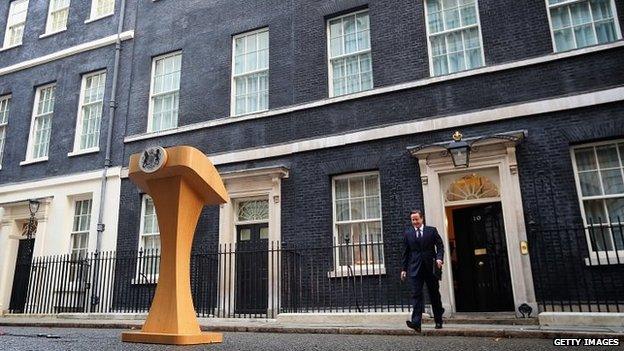The people have spoken. But it's not over
- Published

The people have spoken. Scotland has rejected independence. The result has been accepted by both sides. So that, you might think, is that. Not a bit of it.
The fact that more than 1.5m British citizens voted not to remain part of the UK, the fact that a majority in Scotland's biggest city - Glasgow - backed independence, the fact that the Westminster establishment briefly thought this vote was lost, is the reason for that.
The leaders of the three UK parties are now promising significant constitutional change and not just for Scotland but for England, Wales and Northern Ireland as well.
They have agreed on a timetable for giving more powers to the Scottish Parliament but are a long, long way from agreeing proposals. Alex Salmond may have lost this vote but he remains Scotland's First Minister. He's unlikely to merely accept what is offered up by his opponents.
The prime minister has also promised to produce reforms which deliver the soundbite - "English votes for English laws". It was a promise made in the last Conservative manifesto. It was and is very popular in England. There is a reason, however, why it hasn't been enacted.
It could create two classes of MP. It might mean a government has a majority to pass certain laws but not others (if, for example, the next Labour government did not have a majority of MPs in England).
What's known as the West Lothian question hasn't been answered since it was first asked in 1977. (The question was, Why should the MP for Blackburn in West Lothian in Scotland be able to vote on English matters when the MP for Blackburn in Lancashire can't vote on Scottish issues?)
This referendum may have ended one debate in Scotland - for now. It has, however, lit the touchpaper on the explosive question of where power lies in the UK
- Published19 September 2014
- Published19 September 2014
- Published19 September 2014
- Published9 September 2014